Story submitted by Anne Koletzke at GEVA (Glen Ellen Vocational Acadamy)
Over the 10 or so years I’ve volunteered at GEVA, an Equine Retirement and Rehabilitation Foundation and Sanctuary, one of the things I have most enjoyed is that the horses live outside 24/7 in herds of 2 to 10, depending on the size of their paddock. This means you are able to watch the horses interact with each other; see what relationships develop, last, or change; and watch the dynamics and hierarchy change when a new horse is introduced to the herd or a herd member dies.
It also means that when you are in the paddocks with the horses, you get the opportunity to just be with them, to become, in a way, a part of the herd. At least that’s what it feels like to me when I go in to clean up the paddocks and check their water tanks. In general, since I am preoccupied with my cleaning-up duties, any interaction that may happen between me and the horses rests not with me so much as with them. And I must say, even after all these years, I continue to be delighted (some would say ridiculously delighted), when any of the horses chooses to leave whatever it is he or she is doing to come over to spend some time with me—sometimes to just say a quick hello, sometimes to “help” me clean a water tank, and sometimes, to stay with me as I make my way around the paddock, no matter how long it takes.
There are other times, of course—when I’m not mucking—that I’m the one to initiate contact with the horses in the paddocks, and I’ve learned some things I don’t think I would have learned otherwise. Take grooming for instance. How many people know—really know—how their horses feel about being groomed. Do they love being groomed, hate being groomed, endure being groomed because they have no other choice, or simply don’t care about grooming one way or the other? Well, when the choice to be groomed or not to be groomed is up to the horse and not to you, when the horse is free to leave if he or she wants—regardless of what you want—you find out.

Take Luvy for example. Like most of the horses at GEVA, Luvy is a Thoroughbred, and had been a racehorse—a very slow racehorse. She ran 3 races and came in last in all of them. Then apparently someone thought she might make a polo pony, but that didn’t work out either, so she ended up at GEVA. One day I was in Luvy’s paddock grooming Nopie, one of her two paddock mates and my favorite horse of all time; he had been more successful at racing than Luvy, actually winning a couple of races, but then in only his sixth race, he tore his suspensory ligament, taking a piece of sesamoid bone with it in the process, and that was the end of that career (he’s lucky it wasn’t the end of him). Anyway, I was in the paddock grooming Nopie when Luvy came from across the paddock to stand nearby. I gave her a friendly “Hello, Girl,” and continued grooming Nopie. But then Luvy moved closer, and then closer again. Finally, when she was practically on top of me, I insisted that she back up, which she begrudgingly did. But then she returned, and I sent her away again. By about the fourth time of this back-and-forth nonsense, it finally dawned on me that Luvy might be asking to be groomed, too. So after making her back up yet again, I promised her I’d groom her next; she must have understood me, because this time she stayed back. But when I was done grooming Nopie, she didn’t waste a second coming over, looking so eager, I couldn’t help but laugh. As I brushed her stem to stern and combed out her mane and tail, Luvy’s head dropped and her eyes glazed over in contentment. Had she been a cat, she’d have purred. So this has now become our little routine—I groom Nopie, Luvy comes over, I ask her to back up and she unhappily consents (we do this two or three times), I finish grooming Nopie, I groom Luvy, she “purrs.” I could, of course, just groom Luvy first, but that would not be nearly so much fun for either of us—and besides, Nopie wouldn’t stand for it.

At the other end of the spectrum there is Bob. All Bob has to see is you coming toward him with a brush or a curry comb, and he heads off in the opposite direction—quickly. None of us knows why Bob is this way, but I have a theory. Here’s Bob’s story: After a racing career that was almost as short and unsuccessful as Luvy’s, Bob went on to do quite well at eventing, and after that, as a schooling horse for riders wanting to learn eventing. But finally all that racing, eventing, and schooling took its toll on his body, and when his injuries, aches, and pains were such that he could no longer be a schooling horse, Bob was scheduled to be put down. Fortunately, a young woman who rode him and loved him, determined to find him a home, and so he came to GEVA. And now that no one makes him do anything he doesn’t want to do, you’d never know Bob had ever had any injuries, much less a slew of them, as he runs and bucks with the best of them. With the other horses, he can also be quite the bully when so inclined, which, in truth, is fairly often, and especially if food is concerned. But with people, Bob is basically a polite and cooperative horse, who often makes a pest of himself seeking out attention when anyone enters the paddock—as long as that anyone isn’t carrying a curry comb or a brush. So it’s my theory that Bob associates grooming with working and working with being forced to do something that causes him pain, which boils down to grooming = pain to come. This seems logical to me because it goes without question that Bob would have been thoroughly groomed before racing, before eventing, and before schooling classes. Or maybe I’m wrong; maybe he’s just had it with being fussed over. Either way, he’s made his point, so we just let him be. After all, there are a lot worse things in this world than being a bit untidy.
Choice is such a precious thing. It is so empowering. It is one of the most vital aspects of being a free individual, and it is something we humans treasure for ourselves almost more than anything else. We have fought wars over the right to have it. But we seldom offer it to our horses or our dogs or cats or goats or birds or whatever animals we live with. It is only our choices, our agendas that interest us, not theirs. To some extent this can’t be avoided, of course; veterinary procedures need to be done, trimming and shoeing need to be done, certain aggressive behaviors cannot be tolerated, some areas are not safe, some food can’t be eaten etc. etc. But in so many other instances, is it not possible for us to acknowledge that our horses, and all the animals with whom we share our lives, just might have an opinion or a deep desire about something that concerns them, and to honor it when they clearly show us that they do.






